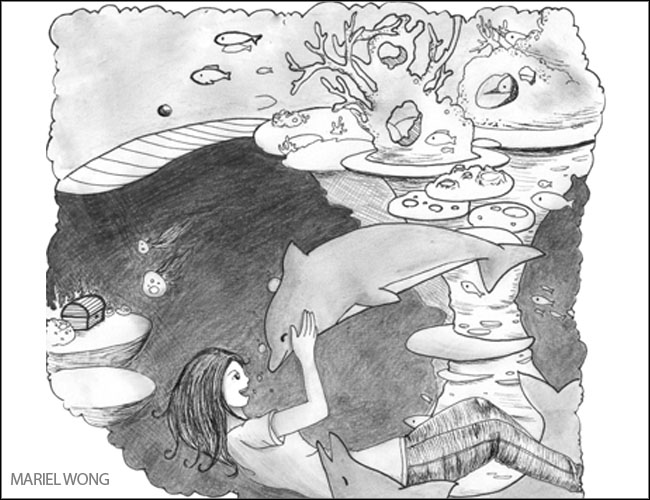
“I always thought that if you could control your dreams, you could build a castle or be a superhero,” says junior Jessica Greenbaum.
Because of this curiosity, Greenbaum taught herself how to lucid dream. Lucid dreaming is a state of sleep in which a person becomes aware that he or she is dreaming. Sometimes dreamers can control certain aspects of the dream, such as weather, location, and atmosphere. However, the two aspects do not always go hand-in-hand. It is more likely for someone to be aware that he or she is dreaming but not have control over what occurs in the dream.
Greenbaum says, “Sometimes you wake up before you can control your dream once you have realized that you’re in one.”
Sophomore Lauren Muniz dreams lucidly on a semi-frequent basis and she says, “Sometimes I can’t control everything. I wanted to move a car and I could not get it to move. I’ve been mastering it lately. It’s connected to what I do in real life. I’m learning to drive, so now I can maneuver vehicles.”
Greenbaum adds, “The first time I had a lucid dream I tried some sort of weird hand gesture and attempted some magic, but my mind didn’t let me. I blasted a wall over, though.”
Although most Americans have had at least one lucid dream that they can recall from their lives, some have never experienced the phenomenon.
Junior Olivia Simon is among those who have never had a lucid dream. She says, “I knew that lucid dreaming existed. Sometimes what people want to dream about they think about before they go to sleep and then they make it happen in their dreams.”
Sophomore Andisheh Kabiri says, “I’ve seen Inception… but I never knew that the idea of controlling a dream from within a dream was real.”
Some of the lucid dreamers at Aragon taught themselves how to lucid dream after hearing about the concept from friends. Greenbaum says, “I googled it and found all these sites.” Others are natural lucid dreamers. “I never had to teach myself to lucid dream,” says Muniz.
Junior Tyler Bray adds, “Jessica [Greenbaum] told me about it and it sounded cool so I looked it up. All the instructions you need are on the Internet… I have had one lucid dream thus far.”
Junior Parvir Aujla says, “My friend told me about it. I have been trying to lucid dream because creating your own world is interesting.”
Three general steps recur in online resources. Greenbaum explains, “Put a significant mark on your hand and check it throughout the day. You are supposed to check it when you start dreaming. If you check it in your dream and it isn’t there, then you know you are dreaming.”
Bray adds, “You have to think about it during the day and right before you fall asleep.”
The final step is making sure that one has enough time to sleep.
Senior Ashley Petroff has been a natural lucid dreamer since she was a kid. She never taught herself how to lucid dream, but she says, “It’s random for me, although I have to be in a deep sleep.”
In addition to general guidelines, many tips and tricks exist that can make the undertaking easier.
Greenbaum says, “Don’t try it on a school night. Practice on the weekends.”
“I heard about goggles [you can wear] that flash red while you are sleeping so you can realize you are in a dream,” says Aujla.
Online sources recommend keeping a dream journal. If one keeps a journal for long enough, he begins to see recurring themes and has the ability to recognize that he is in a dream by those signs. Aujla says, “I keep a journal next to my bed and I record my dreams as soon as I wake up.”
However, lucid dreaming can prove to be elusive. Not only is it difficult to become conscious while remaining asleep, but it is rare to be able to control anything.
Simon says, “I have attempted to have a lucid dream before. Mostly, I think about it before I fall asleep, but I never lucid dream.”
Even though many are intrigued by the concept of limitless creation, Simon adds, “I don’t really want to [lucid dream] on a regular basis. It’s so interesting to see what your [uncontrolled] subconscious is like behind all the noise in your head.”
Kabiri concurs, “I actually would rather not participate in [lucid dreaming]. I feel as though dreaming is our only escape. To control it kind of rids ourselves of our one time to do exactly what we please and be exactly who we dream of being with our subconscious.”
Senior Quin Rogers says, “I have heard about [lucid dreaming] but I don’t know very much about it. I’ve never tried to, but it seems like it could be cool and useful.”
Like most, Aujla has not yet had a lucid dream, but he says, “The reason why I [am trying] is because I want to explore the concept myself… In reality you can’t do everything, but in a dream nothing holds you back.”





